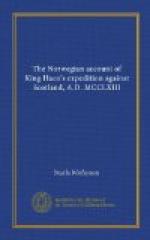[Footnote 3: Thursa sker (orig.) i.e. the giants’ rocks, Thurso.]
[Footnote 4: Solunder-haf, (orig.) the Northern ocean. So called from the Soloe islands near that promontory of Norway called Stad. That species of sea fowl which frequent the Bass, probably received their name from being more commonly found in the Solund isles.]
[Footnote 5: Kiarna-borg, (orig.), Fl. Ms. Kianaborg, from the Irish carn a rock, and the Is. borg a castle. This castle was situated on a rocky islet near Mul. Fordun calls it Carnborg.]
[Footnote 6: Liod-hus, i.e. The residence of Liot. It is not unlikely that the isle of Lewes, & the family of McLeod were so named from Liod earl of Orkney.]
[Footnote 7: Kiarareyiar, in the Mss. Kiarbareyiar, the island Kiararey where Alexander died, suddenly, Jul. 8th. 1249.]
[Footnote 8: Perhaps the Author means Frissel afterwards Bishop of St Andrews; or Michael viz. de Weymyss, who was ambassador to Norway, A. D. 1290.]
[Footnote 9: Jarlin af Ros ok Kiarnakr son Makamals (orig.). The text here is much vitiated. The author might have read in some Irish accounts, Jarl na Ross (William) McKerchar, McCalom, i.e., the Earl of Ross (William) the son of Ferchard, the son of Malcolm. This William Mac Erchart was a young Hero, and is corruptly called Macentagart by the Scottish historians. Or perhaps, three persons may be alluded to, viz., the Earl of Ross, Kinneach-son (of Kintail), and a MacCamal of Lochaw, all powerful chieftains on the west coast of Scotland. It is, however, not impossible that Kiarnak was some ancient chieftain from whom a branch of the Grants was called Clan-Chiarnach. The Fl. Ms. for Makamals reads Machamals.]
[Footnote 10: I Skid (orig.). In the Fl. Ms. istrid e. to war.]
[Footnote 11: The inhuman practice here described was common in those times. From the Landnamaboc we learn that Olver first discouraged this custom. We read, Olver did not permit tossing infants from spear to spear as was usual among pirates, and was therefore surnamed Barna-kall or the protector of Infants.]
[Footnote 12: Jol (orig.). The great brumal festival among the Scandinavians. Hence the Scotch word Yule, i.e., Christmas.]
[Footnote 13: Nid-ar-os (orig.), i.e., the mouth of the river Nid, now Drontheim.]
[Footnote 14: Vikor (orig.), now Bahus in Sweden.]
[Footnote 15: Elfa, the river at Gottenburg.]
[Footnote 16: An Earl of Sweden and father-in-law to Haco the younger.]
[Footnote 17: Liodhusa, a town of Sweden demolished A.D. 1268.]
[Footnote 18: May 3.]
[Footnote 19: i.e., the hilly country. Harald Harfager divided his kingdom into several counties, each of which was to fit out a squadron of ships on an emergency. The counties were again divided into skipreidor, or smaller districts, each of which furnished a single vessel properly equipped.]




